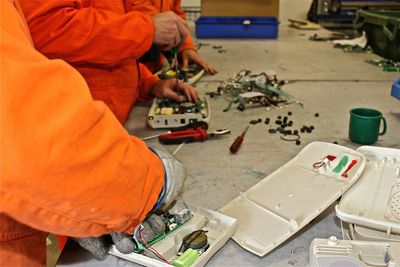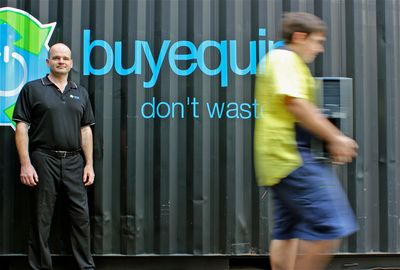Community solution to tackle e-waste
Thursday, 20 September, 2012
Australians are among the highest users of new technology in the world. Our love affair with new gadgets is generating a mountain of e-waste each year, to the point that it is one of the fastest growing waste types in the country. The Australian Bureau of Statistics shows that 16 million units reached their end of life in 2007-08, with 88% going to landfill.
Broadly, there are two main methods for diverting e-waste from landfill - electronics can be automatically shredded or manually disassembled. Buyequip supports manual disassembly, saying it provides the best economic and environmental return.
However, the labour-intensive process of dismantling electronics places economic limits on how much material can be recycled. Buyequip has now partnered with prison industries at the Southern Queensland Correctional Centre (SQCC) near Gatton. This partnership is boosting material recovery rates while providing important employment opportunities for prisoners.
Buyequip transports e-waste to the prison to be dismantled before the components are sent to downstream processors who recover recyclable materials such as plastics, aluminium and copper. The partnership is nearly as old as the prison, which is operated by Serco and opened in January. In just a short time, the partnership has diverted an estimated 23 tonnes of e-waste from landfill.

Buyequip director Brett Hyde said Serco’s ecofriendly philosophy and public-service ethos aligned with his own company’s goals of environmental stewardship and social responsibility.
“E-waste is a huge problem and while there is no magic bullet, partnerships such as this one with Serco are another step in coming up with a community-wide solution,” he said.
“By partnering with Serco we are helping to solve the problems created by thousands of dumped computers and televisions while equipping prisoners with the skills required to hold down a job on their release.”
Both organisations benefit from the partnership because Buyequip employs a labour-intensive process and the industries program engages in labour-intensive tasks. Prisoner demand for places in the industries program usually outstrips supply, which is why Serco favours labour-intensive work that gives the prisoners a better chance to participate. Hyde said although the extra material recovered by prison industries had marginal economic value, the real benefit was the saving to the community from diverting the waste from landfill.
SQCC Assistant Director of Business and Finance Jeff Ticehurst said for many prisoners, the industries program was their first taste of full-time paid employment.
“Industries’ main goal is rehabilitation, as exposure to a work environment builds the prisoners’ self-confidence and prepares them for a productive working life on their release,” said Ticehurst.

“To make it real we have to work in a commercial environment and to do that we partner with business. The fact Buyeuip shares our own values on community and environmental responsibility makes the partnership a natural fit.”
Both Buyequip and Serco can see the potential to build on the partnership they’ve forged. Serco is a registered training organisation and Ticehurst said it would make sense to introduce a Certificate II in Waste Management to complement the work the prisoners were doing.
Hyde said government action and changing technology would drive jobs growth in the e-waste sector over the next decade.
“New legislation requires manufacturers to take responsibility for their products at the end of their life, there are more electronic devices in the home, and the country is switching from analog to digital television. Recycling this e-waste will require an army of workers,” he said.
How Australia can increase its circularity rate
An expert said the solution could lie in developing onshore processing plants and creating...
Scouts SA secures future of its recycling centres
Scouts SA has partnered with Container Deposit Scheme specialist Return-It to grow its Scout...
Mining waste provides strong boost to concrete construction
Flinders University researchers are turning mining waste into a tool for sustainable...








